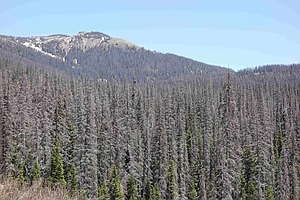
Forests at Risk: Insights from Global Experts on Climate Change

Widespread mortality of Picea engelmanni at Wolf Creek Pass, Colorado
Picture credit: (C) Craig Allen, USGS, Los Alamos, USA
To broadly address this topic, an international group of 65 leading tree physiologists, forest ecologists and modelers from six continents met at the Max Planck Institute for Biogeochemistry in Jena, Germany, from Oct 20 – 23, 2014. Organized by Henrik Hartmann, group leader in the Department Biogeochemical Processes, the meeting facilitated interdisciplinary exchanges between diverse experts as a means to assess the frontiers of research on climate-induced tree mortality.
Covering a wide range of disciplines, all meeting participants provided their two most pressing research questions. As a result from a series of discussions and debates, the workshop scientists jointly developed the following declaration to raise public awareness on the anticipated worldwide climate-induced tree mortality, which bears immense societal and ecological consequences.
Declaration
• Forests are extremely important to society through the many services they provide, and all peoples around the world either depend directly on forests for their livelihood or indirectly benefit from forests.
• Despite existing scientific uncertainties, this group of ecological researchers is confident that many forests are at substantial risk of increased tree death rates and even widespread tree die-off due to projected warmer temperatures, particularly during droughts.
• Thus, this ecological research community wishes to raise awareness of this risk for substan-tial consequences for society from increased forest die-off expected with climate warming, and also that we can reduce this risk by reducing greenhouse gas emissions.
The wide variation in both geographical study sites and fields of expertise represented by the workshop participants provided an excellent basis to determine current research needs and to help guide future research efforts on drought- and heat-induced tree mortality. The experts reconfirmed that forest health assessments on a global scale are lacking. Concomitantly, the geographical extent of forest die-off at the global scale and the vulnerability of individual biomes to increasing temperatures remain highly uncertain. To determine the patterns and trends of forest mortality globally, researchers urged the development of a global monitoring network on forest conditions, based on both internationally available plot networks and remote sensing. “The scientists at our workshop jointly concluded that such data are not only critical to motivate action from governments, policy makers and forest managers, but also to devise specific action strategies to mitigate the underlying climatic conditions”, Henrik Hartmann said.
The breadth of expertise represented, the highly interactive program and the open atmosphere made the workshop a big success. Nearly all scientists have agreed to reconvene in follow-up workshops, to further address the future of our forests.
For further information please see the meeting webpage at https://www.bgc-jena.mpg.de/bgp/pmwiki.php/Main/MortalityWorkshop
Contact:
Dr. Henrik Hartmann
Max Planck Institute for Biogeochemistry
Hans Knöll Str. 10
07745 Jena, Germany
hhart@bgc-jena.mpg.de















